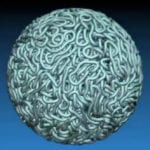 History
History  History
History  Health
Health 10 Everyday Activities That Secretly Alter Consciousness
 History
History Top 10 Historical Disasters Caused by Someone Calling in Sick
 Animals
Animals 10 New Shark Secrets That Recently Dropped
 Movies and TV
Movies and TV 10 Forgotten Realities of Early Live Television Broadcasts
 Technology
Technology 10 Stopgap Technologies That Became Industry Standards
 Weird Stuff
Weird Stuff 10 Wild Facts About Taxidermy That You Probably Didn’t Know
 Travel
Travel 10 Beautiful Travel Destinations (That Will Kill You)
 Miscellaneous
Miscellaneous 10 Modern Marriage Rituals Born from Corporate Branding
 Weird Stuff
Weird Stuff Ten Bizarre Visions of 2026 from Fiction
 History
History 10 “Modern” Problems with Surprising Historical Analogs
 Health
Health 10 Everyday Activities That Secretly Alter Consciousness
 History
History Top 10 Historical Disasters Caused by Someone Calling in Sick
Who's Behind Listverse?

Jamie Frater
Head Editor
Jamie founded Listverse due to an insatiable desire to share fascinating, obscure, and bizarre facts. He has been a guest speaker on numerous national radio and television stations and is a five time published author.
More About Us Animals
Animals 10 New Shark Secrets That Recently Dropped
 Movies and TV
Movies and TV 10 Forgotten Realities of Early Live Television Broadcasts
 Technology
Technology 10 Stopgap Technologies That Became Industry Standards
 Weird Stuff
Weird Stuff 10 Wild Facts About Taxidermy That You Probably Didn’t Know
 Travel
Travel 10 Beautiful Travel Destinations (That Will Kill You)
 Miscellaneous
Miscellaneous 10 Modern Marriage Rituals Born from Corporate Branding
 Weird Stuff
Weird Stuff Ten Bizarre Visions of 2026 from Fiction
Top 10 Accidental Discoveries
Some of man’s greatest discoveries have been made entirely by accident. If it weren’t for many of these things, life would be very different for us. This is a list of the 10 greatest accidental discoveries.
10. Viagra

Millions of men around the world owe a salute to the hard working stiffs in the Welsh village of Merthyr Tydfil where, in 1992, their hard work testing this new angina drug produced firm evidence of its unexpected sex enhancing power. This discovery would be much higher on the list if it weren’t for the fact that it is the cause of 90% of the spam I receive every day!
9. Chocolate Chip Cookies

According to Nestle, Mrs. Wakefield (owner of the Toll House Inn) was making chocolate cookies but ran out of regular baker’s chocolate, so she substituted it with broken pieces of semi-sweet chocolate, thinking that it would melt and mix into the batter. It clearly did not, and the chocolate chip cookie was born. Wakefield sold the recipe to Nestle in exchange for a lifetime supply of chocolate chips (instead of patenting it and making billions!) Every bag of Nestle chocolate chips in North America has a variation of her original recipe printed on the back (margarine is now included both as a variant on butter and for those people who want to pretend it is healthy).
8. Popsicles
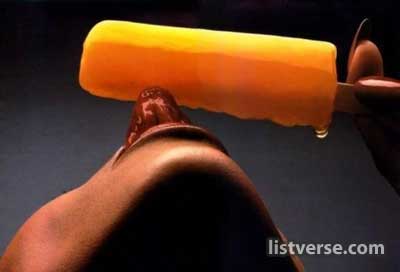
The Popsicle was invented by an 11 year who kept it secret for 18 years. The inventor was Frank Epperson who, in 1905, left a mixture of powdered soda and water out on the porch, which contained a stir stick. That night, temperatures in San Francisco reached a record low. When he woke the next morning, he discovered that it had frozen to the stir stick, creating a fruit flavored ice treat that he humbly named the epsicle. 18 years later he patented it and called it the Popsicle.
7. Artificial Sweetener
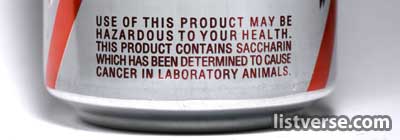
Like many artificial sweeteners, the sweetness of cyclamate was discovered by accident. Michael Sveda was working in the lab on the synthesis of anti-fever medication. He put his cigarette down on the lab bench and when he put it back in his mouth he discovered the sweet taste of cyclamate. Aspartame was discovered in 1965 by James M. Schlatter, a chemist working for G.D. Searle & Company. Schlatter had synthesized aspartame in the course of producing an anti-ulcer drug candidate. He discovered its sweet taste serendipitously when he licked his finger, which had accidentally become contaminated with aspartame. Saccharin (the oldest artificial sweetener) was first produced in 1878 by Constantin Fahlberg, a chemist working on coal tar derivatives in Ira Remsen’s laboratory at the Johns Hopkins University, and it was he who, accidentally, discovered its intensely sweet nature.
6. Brandy
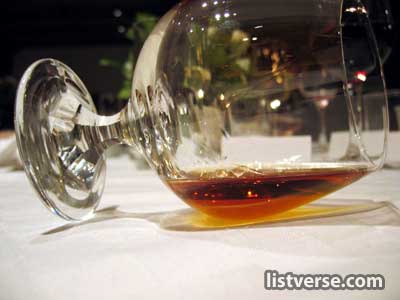
Initially wine was distilled as a preservation method and as a way to make the wine easier for merchants to transport. It was also thought that wine was originally distilled to lessen the tax which was assessed by volume. The intent was to add the water removed by distillation back to the brandy shortly before consumption. It was discovered that after having been stored in wooden casks, the resulting product had improved over the original distilled spirit. No one is sure who it was that discovered the delightful taste of this distilled liquor, but he was clearly guided by God in its discovery for the betterment of man.
5. Teflon

Teflon was invented accidentally by Roy Plunkett of Kinetic Chemicals in 1938. Plunkett was attempting to make a new CFC refrigerant, the perfluorethylene polymerized (say that 3 times fast!) in a pressurized storage container. In this original chemical reaction, iron from the inside of the container acted as a catalyst. In 1954, French engineer Marc Grégoire created the first pan coated with Teflon non-stick resin under the brand name of Tefal after his wife urged him to try the material, that he’d been using on fishing tackle, on her cooking pans. Teflon is inert to virtually all chemicals and is considered the most slippery material in existence – second only to the political wrangling of President George Bush.
4. Microwave

Percy LeBaron Spencer of the Raytheon Company was walking past a radar tube and he noticed that the chocolate bar in his pocket melted. Realizing that he might be on to a hot new product he placed a small bowl of popcorn in front of the tube and it quickly popped all over the room. Tens of millions of lazy cooks now have him to thank for their dull food!
3. Potato Chips

The first potato chip was invented by George Crum (half American Indian half African American) at Moon’s Lake House near Saratoga Springs, New York, on August 24, 1853. He was fed up with the constant complaints of a customer who kept sending his potatoes back to the kitchen because they were too thick and soggy. Crum decided to slice the potatoes so thin that they couldn’t be eaten with a fork. Against Crum’s expectation, the customer was ecstatic about the new chips. They became a regular item on the lodge’s menu under the name “Saratoga Chips” and a large contributing factor of the Western world’s obesity problems.
2. LSD

LSD was first synthesized on November 16, 1938 by Swiss chemist Dr. Albert Hofmann at the Sandoz Laboratories in Basel, Switzerland, as part of a large research program searching for medically useful ergot alkaloid derivatives. Its psychedelic properties were unknown until 5 years later, when Hofmann, acting on what he has called a “peculiar presentiment,” returned to work on the chemical. While re-synthesizing LSD-25 for further study on April 16, 1943, Hofmann became dizzy and was forced to stop work. In his journal, Hofmann wrote that after becoming dizzy he proceeded home and was affected by a “remarkable restlessness, combined with a slight dizziness”. Hofmann stated that as he lay in his bed he sank into a not unpleasant “intoxicated like condition” which was characterized by an extremely stimulated imagination. He stated that he was in a dreamlike state, and with his eyes closed he could see uninterrupted streams of “fantastic pictures, extraordinary shapes with intense, kaleidoscopic play of colors.” The condition lasted about two hours after which it faded away. Following this, he took a massive dose on what has become known as Bicycle Day. You can read more about Bicycle day on Wikipedia. It is worth the read!
1. Penicillin
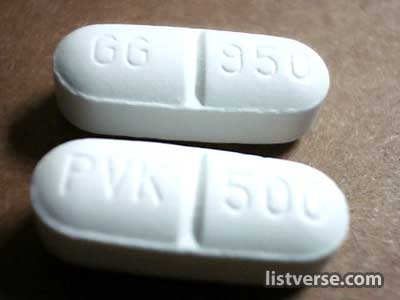
In 1928, Scottish Scientist Sir Alexander Fleming was studying Staphylococcus – the bacteria that causes food poisoning. He turned up at work one day and discovered a blue-green mould that seemed to be inhibiting growth of the bacteria. He grew a pure culture of the mould and discovered that it was a Penicillium mould. After further experiments, Fleming was convinced that penicillin could not last long enough in the human body to kill pathogenic bacteria, and stopped studying it after 1931, but restarted some clinical trials in 1934 and continued to try to get someone to purify it until 1940. The development of penicillin for use as a medicine is attributed to the Australian Nobel Laureate Howard Walter Florey – he shared the Nobel Prize with Fleming and Ernst Boris Chain.
This list quotes verbatim from the Wikipedia article Lysergic Acid Diethylamide.




